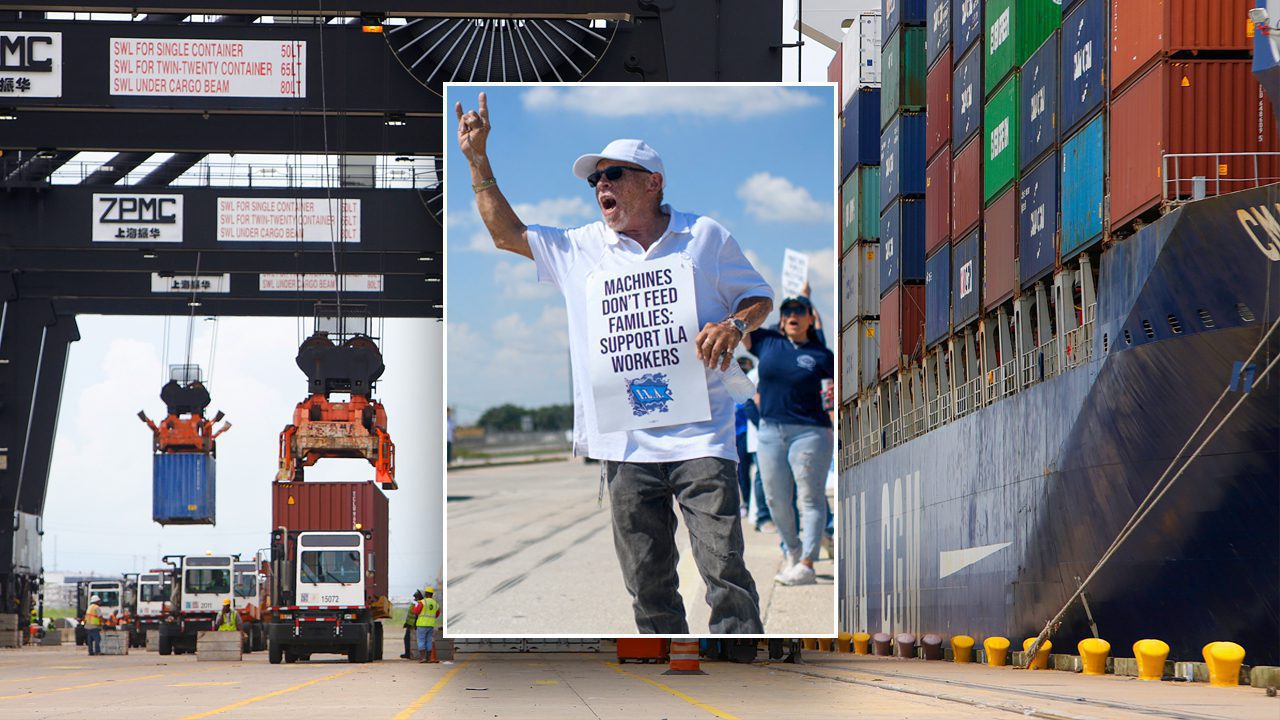The components that make up the smartphone in your hand, the car you drive and nearly all manufactured goods – and the American companies that make them – are facing a combined multi-billion dollar risk under the ongoing port strike.
“A big concern is that the longer this goes on, it is going to start impacting production here in the U.S. There’s only so much mitigation you can do, stockpiling supplies or storing products that are waiting to be exported,” American Chemistry Council (ACC) senior director of regulatory and scientific affairs Jeff Sloan told Fox News Digital on Thursday.
“The timeline for when those impacts start happening… are going to start being built within a week of the strike starting. And they’re going to snowball from there.”
The ACC represents the domestic chemical industry, in which about 90% of their waterborne imports and exports operate in the East and Gulf Coast ports. About $100 billion worth of products flow through the impacted ports per year.
U.S. PORT WORKER SPEAKS OUT ON THE PICKET LINE: ‘WE’VE TAKEN LESS THAN WE’VE DESERVED IN THE PAST’
As of Thursday afternoon, the nationwide unionized strike of the International Longshoremen’s Association (ILA) across 36 ports from Maine to Texas raged on, as the group has yet to reach agreement on a new contract with the U.S. Maritime Alliance (USMX).
More than 10% of U.S. exports are chemicals, according to the ACC, who have voiced greater worries about the dockworkers strike stalling critical exports and domestic production.
“Our industry is really at the top of the supply chain. Chemistry goes into virtually every manufacturing sector in the U.S.,” Sloan said. “Companies are reporting that they have tens of millions of dollars worth of products in containers that are stranded. These are the products that were supposed to be going out on ships as exports, and they are stranded. Billions of dollars worth of products are just sitting there until this gets resolved.”
ACC members typically ship their materials not in cargo containers, but rather large chemical tankers that have private terminals at the ports.
“The Port of Houston, that is the most important port for our industry. And 62% of the containers exported from Houston are plastic and chemical products,” ACC director of advocacy communications Scott Jensen also told Fox News Digital.
“Chemicals and plastic resins, these are high-volume products. And there’s only so much space to store that. And once you run out of space, you have to slow down or even shutter production,” Sloan expanded.
When weighing potential back-up plans, diverting shipments to major West Coast ports like Los Angeles and Long Beach is reportedly not an option.
“Companies are doing everything they can to mitigate the effects… But the options to do that are very limited… A high-volume product like plastic resin, it’s very difficult to divert that from the production, which is primarily in the Gulf Coast area, out to the West Coast. Some of it may be done, but you’re not going to be able to divert that much volume of imports,” Sloan said.
“Our companies are going to be competing with every other exporter and every other importer for space on the rail network and those ports that continue to operate,” he continued.
In a statement made on Thursday, the president of a local International Longshore and Warehouse Union (ILWU) on the West Coast told FOX Business that if any ships are diverted, they won’t unload the cargo.
The ACC is urging the Biden administration to “use every tool” in their toolbox, including the widely-debated Taft-Hartley Act, to have both parties reach an agreement sooner rather than later.
“I think everybody would really like to see the parties come to an agreement. They think that’s the best course of action. But at the same time, you can’t have this go on for too much longer,” Jensen noted.
GET FOX BUSINESS ON THE GO BY CLICKING HERE
“Right now, China is the leading chemical manufacturing country in the world. We’re second,” he also pointed out. “Not being able to move this chemistry out of the United States further disadvantages us when it comes to chemical manufacturing and helps out our competition, i.e. China.”
“When we have things like this, it really undercuts the effort for manufacturing,” Sloan said. “Some of those key manufacturing sectors that we’re trying to build up in the U.S. still requires imports of some critical inputs, and that is at risk from this change.”
White House press secretary Karine Jean-Pierre told FOX Business’ Edward Lawrence earlier this week that President Biden has no plans to intervene in the strike.
